Charles Wei, the Chairman of HP Lighting shed some light on UV LED product development trends and solutions in an exclusive interview with LEDinside at IR+UV EXPO 2015, which took place in Pacifico Yokohama, Japan, from April 22-24, 2015.
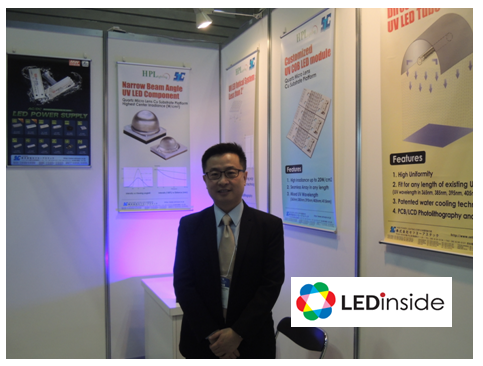 |
|
Charles Wei, the Chairman of HP Lighting. (LEDinside) |
HP Lighting was founded in 2005, and has been improving its UV LED product technology, such as its products irradiance, package material, and compatibility. The company is an industry leader in UV LED optics and system designs. Following UV technology and market developments, the company has prioritized optimizing optic designs to reach uniform parallel lighting effect. As a result, HP Lighting has featured four major UV LED products, PCB UV curing machines, printing, and the company provides system solutions to the LCD exposure market, which remains one of the most difficult market to enter.
The major UV LED technology challenge in PCB UV curing machine applications is the irradiance’s uniformity, and ensuring the intensity of the irradiance at the center and corners of the machine remain the same. This has been the main obstacle for single wavelength UV LEDs to replace linear wavelength traditional mercury vapor lamps. HP Lighting’s best UV LED tube solution is a LED tube that utilizes wavelengths ranging from 365 nm to 415 nm. Besides strengthening and adjusting irradiation in the center of the machine with the company’s in-house designed secondary optic lenses, HP Lighting also uses reflectors to evenly distribute lighting onto the PCB for curing. In addition, the company has its own water cooling system patent, and has sent samples of the machine to PCB UV curing manufacturers.
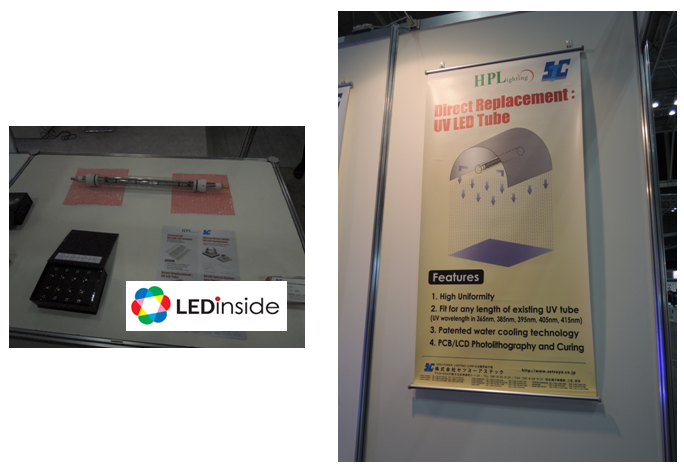 |
HP Lighting's Direct Replacement: UV LED Tubes for PCB, LCD and IC exposurer applications. (LEDinside)
|
Product 1: UV LED tubes with reflector designs to directly replace traditional mercury vapor lights (Direct Replacement: UV LED Tube)
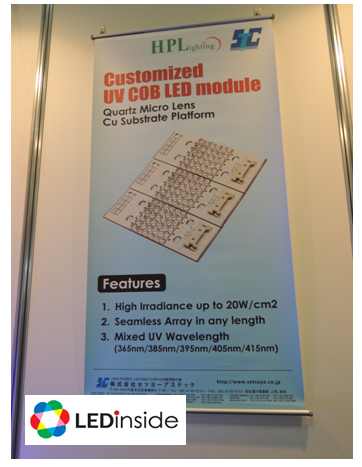 |
|
HP Lighting customized UV COB LED module. (LEDinside) |
Product 2: Customized UV COB LED module
For high speed printing and smartphone display curing market, HP Lighting has released quartz glass optic designs and copper substrate UV COB LEDs that integrate different UV LED wavelengths (365 nm-415 nm). The company can customize the product to meet client wattage demands by seamlessly connecting several modules, each module’s irradiance can reach 20 W/cm2.
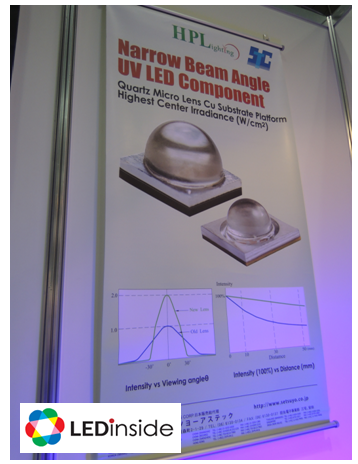 |
|
HP Lighting narrow beam angle UV LED component. (LEDinside) |
Product 3: Narrow beam angle UV LED component
The company has released single UV LED components targeting the market for small curing machines to provide clients with excellent Cost/Performance (C/P) products. HP Lighting stressed irradiance can be raised by improving the optic design, which takes into consideration the distance of the machine. By using special lens design, the company has improved the intensity of the irradiance even when the machine is moved further away.
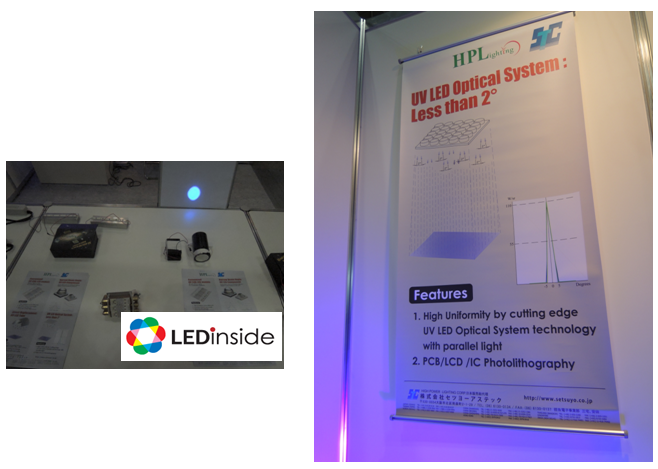 |
|
HP Lighting's UV LED optical system design with less than 2° light beam angle. (LEDinside) |
Product 4: UV LED optical system design with less than 2° light beam angle
UV LED exposurer has always been particularly difficult to design because it is relatively hard to achieve parallel lighting in the UV LED optic design. Mercury vapor lights can achieve parallel lighting by employing bending glass tube designs, but LEDs will lose an unnecessary amount of efficacy when using the same kind of design. However, the UV LED optic design released by HP Lighting uses special secondary optic lenses, and the company has achieved less than 2° light beam angle for parallel lighting, which is an optical design that provides more uniform lighting distribution. The design is applicable to PCB, LCD, and IC exposurers. In addition, the product design highlights the introduction of new equipment applications.
HP Lighting has relied on its package technology in copper substrate, and quartz glass optic designs to become one of the leading UV LED manufacturers in the Greater China Region, while expanding in the global market.
LEDinside perspective:
The Minamata Convention on Mercury is an international treaty passed in October 2013 demands signatory states of the convention to ban the manufacturing, and import of mercury products. Hence, the Japanese government has been aggressively developing UV LED products to replace the traditional mercury vapor lamp market demands. The next application market for UV LED products will be UVC, which will have a diverse application market following improvements in luminous efficacy levels in the next two years.
Aside from UV wavelength and intensity of irradiance, the UV market is also spurred by technology developments in intensity of irradiance, UV glue and photoinitiator advancements to improve UV LED market developments. Besides being mercury free, UV LEDs are light sources with electricity costs typically only 1/5 that of traditional mercury vapor lamps. Moreover, it is a light source that has low thermal dissipation, which is helpful in lowering environmental temperature. Lastly, the product has a relatively long lifetime, which overall has a much lower system cost.
(Author: Joanne Wu, Assistant Manager, Research Division, LEDinside/ Translator: Judy Lin, Chief Editor, LEDinside)
















